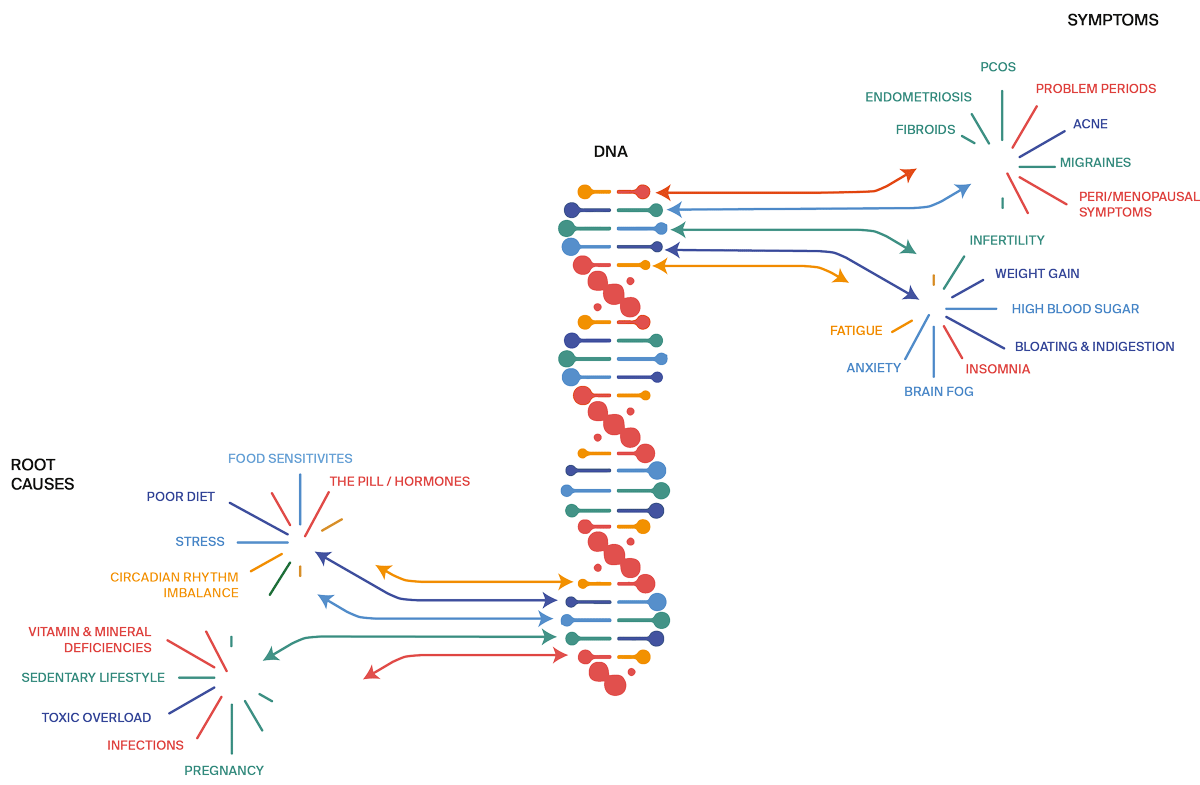I learnt so much about my body whilst working with Sandra
What is Functional Medicine?

Medicine that makes sense
The historical meaning of ‘medicine’ or Medicina, referred to the art of healing, or the means of healing, from medicinus, relating to healing, from medeor or medicor, to heal or cure. The current definition of medicine refers to ‘the science or practice of the diagnosis, treatment, and prevention of disease’ and makes no mention of healing. Yet when you are suffering you want to go beyond diagnosis and medication, you want to be healed.
Healing involves locating and treating the origin of the symptom or condition and understanding that our minds, bodies and environment are intimately connected in creating health, or disease. This is exactly the foundation of Functional Medicine.
I have spoken to conventional doctors who chose their profession because they believed they were going to help people heal, yet they were all trained to diagnose and prescribe medications that suppress, not resolve symptoms. It was a rude awakening to realise that conventional medicine does not heal, it only suppresses symptoms with medications and more medications are prescribed to suppress the side effects of the original medications.
Your body is an interconnected system which logically responds to environmental stressors to create symptoms
Environmental stressors interact with DNA to produce symptoms such as anxiety, fatigue, chronic pain, infertility, thyroid disease, digestive disorders, and many more. Which symptoms develop thus depends on you: your specific DNA, the environment you inhabit and the lifestyle choices you make.
Currently in conventional medicine there’s a doctor for every part of your body, and drugs to suppress symptoms. But a human body is not simply a collection of independent organs divided up by medical specialties for the convenience of doctors.
In contrast, Functional Medicine provides a framework in which multiple variables are taken into account. Hence functional medicine focuses on the promotion of health, rather than the management of disease. It is an approach which addresses you as a whole person – your genetics, your environment and your lifestyle – not just your isolated set of symptoms.
Instead of asking, “Which drug matches up with this disease?” Functional Medicine asks the vital questions that very few conventional doctors ask: “Why do you have this problem in the first place?” and “Why has function been lost?” and “What can we do to restore function?” In other words, Functional Medicine looks to find the root cause or mechanism involved with any loss of function, which ultimately reveals why a set of symptoms is there in the first place, or why you have a particular disease label.
Functional Medicine is Root Cause Medicine
Finding the root causes means addressing the engine, not the engine light. If the engine light of your car comes on, do cover it up with a sticking plaster or do you investigate under the hood? Functional medicine is not about giving you a drug or even a nutrient for a symptom, but instead investigating why you have that symptom and working on that until optimal health is reached.
For example, suppose 5 different women have the same complaint, whether it is depression, fatigue, digestive problems, or persistent skin rashes. Each of those 5 women can have the same symptom, but for 5 very different reasons. An overgrowth of gut bacteria may be causing depression in one woman, while it is a gluten intolerance in another. Fatigue can be the result of a blood sugar sugar in one woman, and autoimmune B12 anaemia disease in another.
As a Functional Medicine practitioner I want to help you understand why you have a health problem
Until you understand why you are suffering from a health problem, chasing after medications or therapies can keep landing you at dead ends. I rely on published, peer reviewed science to help us understand how your body should work and where breakdowns have occurred. Lab tests, questionnaires, and an in-depth discussion about your case history helps me learn where the root causes lie.
There are 3 common root causes:
Although different women can have the same symptom for different reasons, functional medicine often finds common root causes. Some of them are:
- Nutritional
- Deficiencies- vitamins, minerals, protein, fats, fibre, phytonutrients
- Food intolerances, especially to gluten and dairy
- Excess blood sugar (insulin resistance, or pre-diabetes)
- Impaired detoxification or toxin overload
- Poor liver function leading to a high toxic burden
- Intestinal bacterial and yeast overgrowths
- Stress
- Psychological stress
- Cellular stress leading to inflammation
Addressing these factors, depending on the circumstances, can relieve not only the symptom that brought you to the clinic, but a number of other symptoms as well.
All systems and parts are interrelated
The body is a highly complex web in which all systems and parts are related. The body does not have specialties in the way medicine does. The digestive system – or any other system in the body – does not function independently of the rest of the body.
For instance, if autoimmune disease is destroying the thyroid gland, it’s not just the thyroid you address, but also the immune system. If the gallbladder is acting up, addressing a gluten intolerance and chronic inflammation can sometimes prevent gallbladder surgery.




